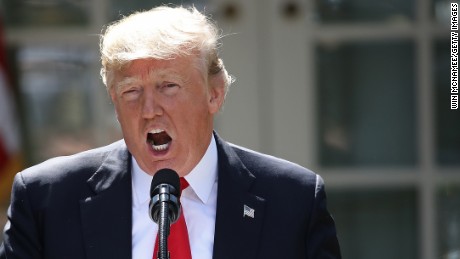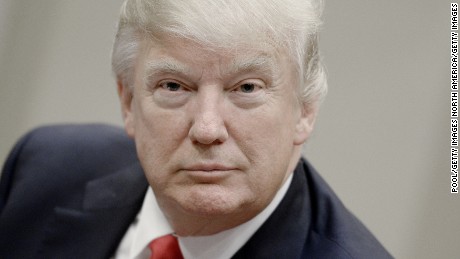What does the Paris climate deal look like without the United States?
Updated 0211 GMT (1011 HKT) June 2, 2017
(CNN)It was described by former US President Barack Obama as "a turning point for our planet."
A landmark deal, ratified by 147 parties or countries, the Paris Agreement on Climate Change was aimed at cutting emissions and keeping global temperatures from rising more than 2 degrees Celsius above pre-industrial levels.
But the future of 2015 accord now hangs in the balance after US President Donald Trump announced Thursday he would withdraw from the agreement.
The decision to drop out puts the US at odds with nearly every other nation on Earth.
The EU and China have reportedly signed an agreement to counteract any retreat by the US on their global emissions reduction targets.
When questioned prior to the US withdrawal Thursday, a spokesperson for China's Ministry of Foreign Affairs described climate change as a global challenge that no one country can ignore.
The departure of the US makes it significantly harder to avoid temperatures rising by more than two degrees Celsius by 2100, according to climate modeling by US not-for-profit Climate Interactive.
So just how big is the US's climate footprint? And what does the withdrawal mean for the rest of the world -- both now and in the long-term?
How large are US CO2 emissions?
The US is the second worst emitter of carbon dioxide in the world, according to the European Commission's emissions database, behind only China.
In 2015, it released 5.1 million kilotons of carbon dioxide, more than all 28 European Union countries combined, and makes up almost a sixth of all global emissions.
Obama had made efforts during his administration to reduce US emissions in an attempt to avert catastrophic climate change.
But since coming into office, Trump has already signed executive orders to make it easier to mine coal as well as removing Obama's 2013 Climate Action Plan.
Trump had previously expressed his refusal to accept the science of climate change.
What is the Paris Agreement, anyway?
Agreed to at the 21st Conference of Parties, or COP21, in 2015, the Paris Agreement had just one major aim -- to keep average global warming due to climate change to within the dangerous 2 degree Celsius (3.6 degrees Fahrenheit) threshold.
Individual countries could each decide how they would reach that target, but the pledges would have to grow over time and from 2018, a new strategy would be required every five years.
"It was a significant move forward ... the fact that there's just so much agreement and good will on all parts, including some nations that had been (reluctant) in the past," Professor Ian Simmonds of University of Melbourne's School of Earth Sciences told CNN.
It has been ratified by 147 parties or countries already, including all the world's largest carbon emitters. The US committed to reducing climate emissions by 26-28% in a decade at the time.
But some scientists have pointed out even with the agreement in place, halting global warming at two degrees might be unattainable.
"Over the last two years we've broken the mean global temperatures records (every year) -- 2014 was a new record, 2015 smashed that record and we beat that again in 2016," Simmonds said.
What impact does the US withdrawal have?
Any delay in US efforts to halt greenhouse gas emissions could cost the country and the world in the long term, scientists say.
According to CNN's John D. Sutter the 2 degrees goal is incredibly consequential. "The fate of the planet -- and the mess we shove on future generations -- hangs in the balance."
The vast majority of scientists agree that higher temperatures will cause rising seas, flooded coastal cities, mass extinction, drought, migration crises, deadlier heatwaves, crop failures, and stronger storms.
A December 2016 study released in Nature Climate Change journal said a US delay could make the Paris Agreement targets "unreachable."
Analysis by the Climate Interactive team said if the US dropped out of the Paris Agreement and took no action, global temperatures could rise 0.3 degrees higher compared to if they stayed.
"A US climate retreat will no doubt leave a big hole on the international climate regime ... It will also be a major geopolitical and reputational blow for the US," Li Shuo, climate analyst for Greenpeace China told CNN.
However, not all experts agree it will be disastrous for efforts to reach global climate goals.
Sydney University environmental politics professor David Schlosberg told CNN that other major countries, China and India, could likely pick up the slack, leaving the US politically isolated.
"Trump really isn't as relevant as he wants to be... I think there will (even) be an effort on the part of many US states and localities to help the US meet its stated voluntary goal anyway," Schlosberg said.
California has also previously said it would help pick up the slack for any backdowns by the US President on climate change.













